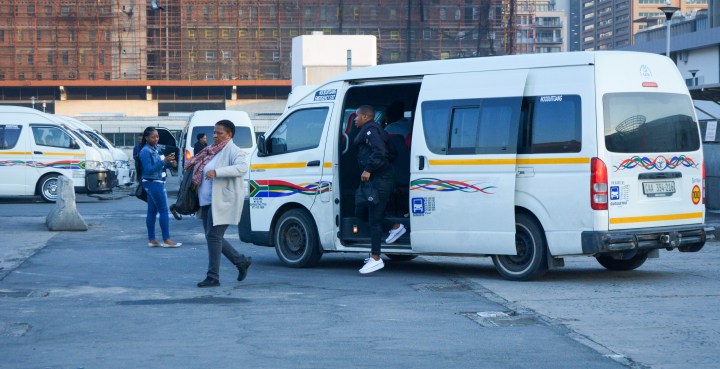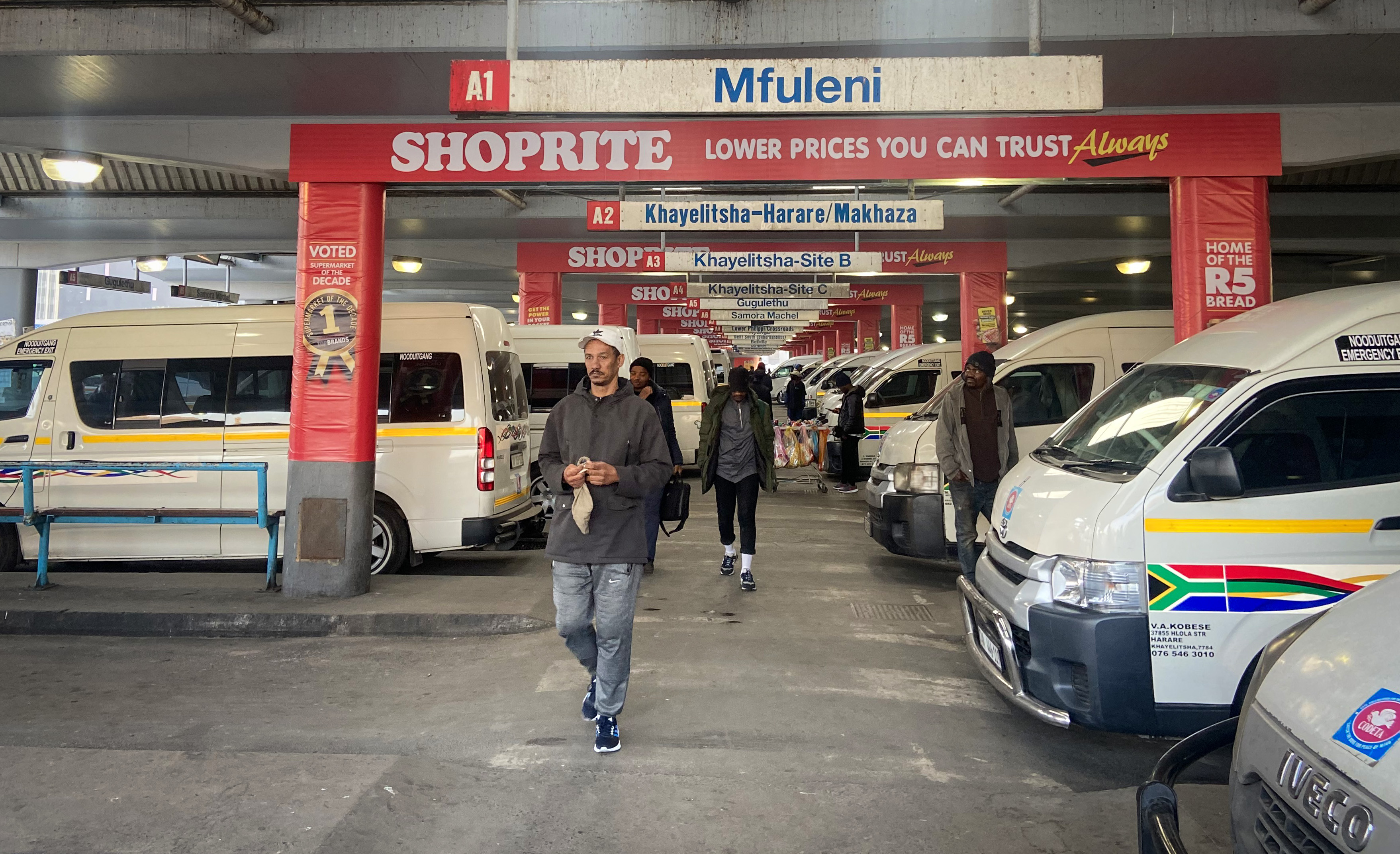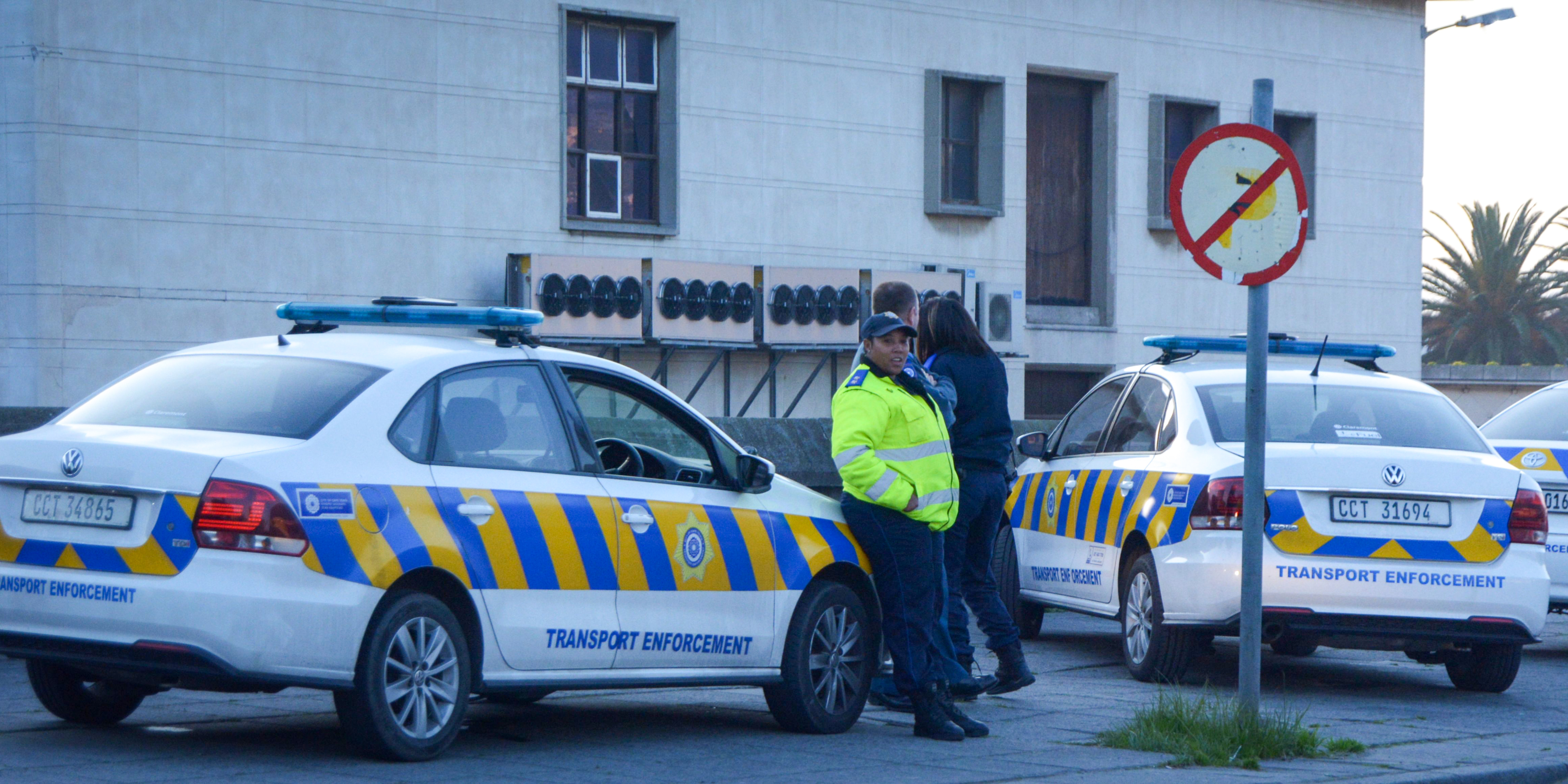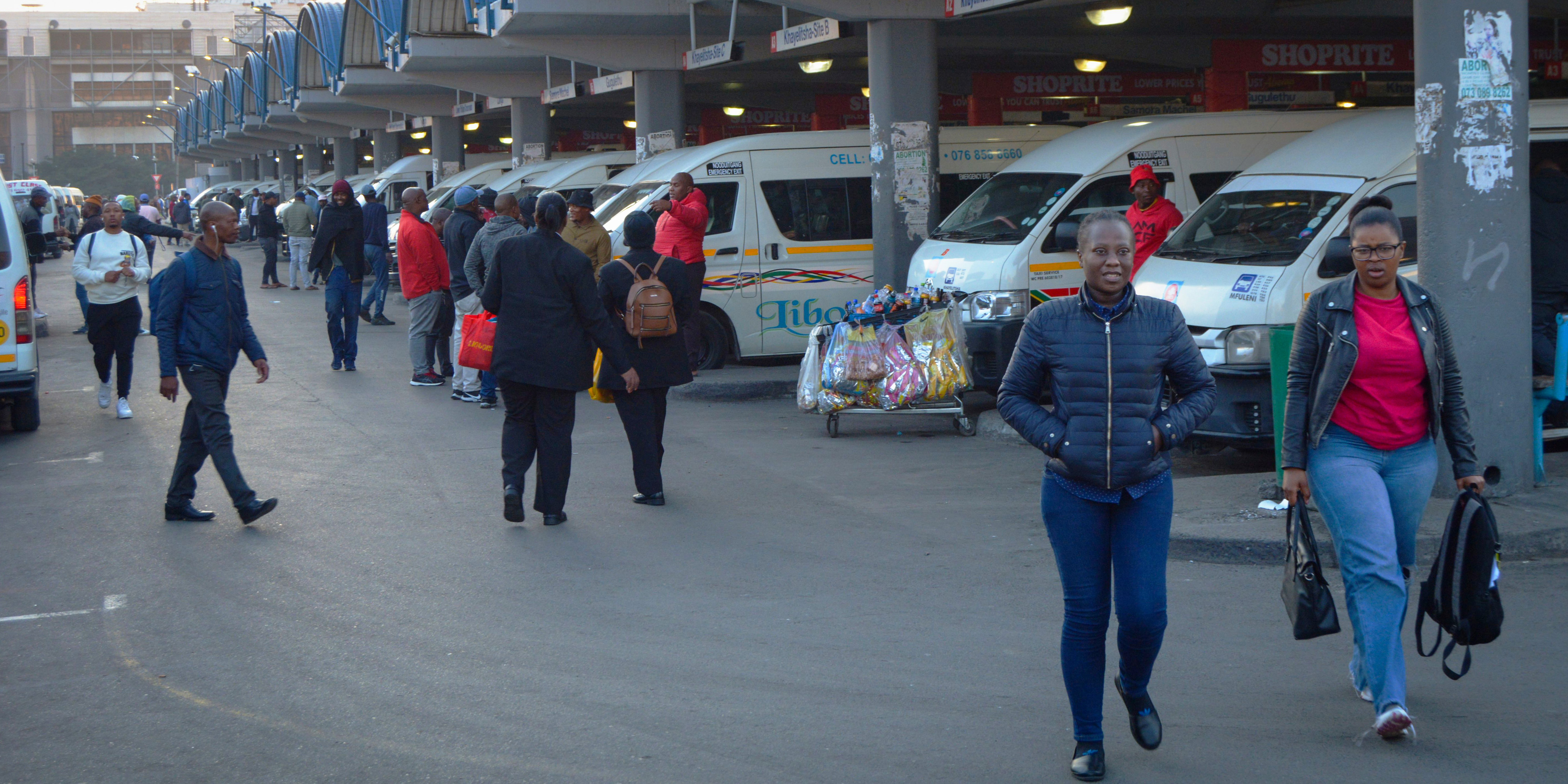TRANSPORT STRIFE
‘I was crying daily’ – relieved Western Cape commuters reflect on ‘tough’ strike as taxis return to roads

Taxis are back on the road after an eight-day strike, during which five lives were lost and Cape Town was brought to the brink. Role players are now laying out rules of engagement to prevent another mass strike, and it is clear from a joint media briefing between the South African National Taxi Council and government officials that there are unresolved issues.
On Friday, 11 August, commuters were relieved to get back to using taxis instead of using extra money or even walking to get to work. This relief was felt by leaders involved in negotiations but taxi drivers themselves too.
The strike – which lasted for eight consecutive days – was called off late on Thursday evening by Santaco after resumed talks with government authorities.
Read more in Daily Maverick: ‘A great relief’ — Santaco calls off Western Cape taxi strike
The strike action by an industry that transports 75% of commuters who rely on public transport in the Western Cape, led to commuters being unable to get to work or school, disruption of service delivery and shop supplies and medical services. A spillover of incidents of violence included looting, stoning, arson and the tragic death of five people.
Read more in Daily Maverick: Taxi strike – Some facts on how big the industry is, how much drivers make and the role in crime
Returning to work for the first time since Thursday, Akhona Ngqentsu, a street vendor at the Cape Town taxi rank, said he was overjoyed with the return of taxis because his business depended on commuters who pass his stall from the rank. “When it comes to my business, the strike really affected me. I had not budgeted for something like this. I am overjoyed that the taxis are back. At least I’ll be back to selling and making a few cents for myself,” said Ngqentsu, who is from Nyanga.
Monitoring the return of the minibus taxis to what was an echoey taxi rank, Excellerate Services security guard Bonginkosi Ncwaba, from Khayelitsha, had gone back to work on Thursday since he was not aware that the strike had been extended. He managed to get a lift from Khayelitsha to Mitchells Plain before catching a MyCiti bus.
It feels like we have survived a Cold War.
On Friday, Ncwaba said the number of commuters using taxis was not at its peak yet, saying, “today people are testing the waters”.
“It’s not as packed as it’s known to be today. This is because there is still this tension between the commuters and the taxi industry and, of course, some people are still fearful of being stranded again. Things are most likely to go back to normal on Monday – remember, it’s Friday today,” he said.
As people waited for the storm to pass, Sisipho Molefe, a call centre employee at Teleperformance, went back to work on Saturday. Teleperformance had booked its staff into The Capetonian for the duration of the strike. Molefe told Daily Maverick that she was homesick and felt exhausted and drained.
“I’m really tired. I just want to go home. I’ve been repeating the same clothes and I don’t have proper toiletries. My mother’s situation has been stressing me. She can’t go to work and, you know, no work no pay, hey,” said Molefe.
Molefe was excited to go home later today after work, saying: “It feels like we have survived a Cold War.”
“The first thing I’m doing when I get home, I’ll definitely have a home-cooked meal”.

Cape Town taxi rank back in operation on Friday morning, 11 August 2023. (Photo: Samane Jnr Marks)
Tracy Mzwandela, a construction worker at the Cape Town station, told Daily Maverick that he had to walk from Parow to Kensington to get a bus to work during the strike. “The minibus taxi holds immense power in Cape Town. I was crying daily,” he said.
“I moved from using R120 a week with a taxi from and to work, to using R400 because where I work at the Cape construction company, if you don’t show up to work they deduct from your pay. It was tough, but when I received the message yesterday that taxis are operating from tomorrow again, I was like, finally,” added Mzwandela.
Zakes Shabangu first spoke to Daily Maverick on the Thursday of the taxi strike. “I won’t forget that for the first time in my life I had to walk to Mfuleni. I even left my stock here in the rank just to get home. It was a tough, long road.”
It proved that no one in the transportation industry cares about the passengers. I believe it is time for the government to improve the buses and trains in every area.
Shabangu said it felt good to be back in business and working. “It has been a difficult, strenuous week without any income and work done due to the taxi strike.”
Graham van Wyngaardt, a taxi driver who lives in Parow, said: “It was tough when we were at home. We also struggled cause there was no income, but at the end of the day it’s work. But overall our voices as drivers were heard.
“If we don’t operate there’s no work, even for the small business here in the station deck. The industry is like a circle, it’s not just taxi drivers whose lives and jobs are included in that.”
Wyngaardt continued: “All I can say is that the stay-away hit me hard in the pocket, but it was for a good cause now we’re back in business.”
“I’m relieved, woke up filled with lots of joy and energy. This happened unexpectedly and forced us to go over budget,” said Gastavias Mokoho, who added: “Using the e-hailing services in that situation was very tough because prices were skyrocketing every minute… It proved that no one in the transportation industry cares about the passengers. I believe it is time for the government to improve the buses and trains in every area.”
Tensions at taxi media briefing
There was an unmistakable sense of tension during a briefing where Santaco and government officials were addressing the media in Cape Town on Friday morning.
Western Cape premier Alan Winde said they were still calculating the economic impact of the strike, but the biggest impact was the loss of life.
“It was difficult getting medicine to people, social development offices [were] closed. The last loss is the image (of the province, Cape Town in particular). We have had travel warnings issued that will affect our tourism.”
The taxi strike came after the Western Cape had recorded a surge in tourism, with tourist arrivals at Cape Town International Airport in the first six months of 2023 exceeding pre-pandemic levels.
MEC of mobility Ricardo Mackenzie lashed out at Santaco, saying some of their demands were unreasonable, and insinuated that the taxi council wanted drivers to be allowed to drive under the influence of alcohol.

Transport enforcement on guard on the taxi deck in Cape Town on 11 August 2023. (Photo: Ziyanda Duba)
Santaco deputy chairperson Nceba Enge responded by saying they would never send a driver to drive drunk, but that if a driver is caught drunk, he must be punished, but the vehicle must not be impounded.
Mackenzie also brought up the issue of Santaco calling for a strike without consulting them. Enge said they had engaged all stakeholders, but Mackenzie was having none of it. “No one from us was there,” he said. “You did not call all stakeholders and before the announcement, I begged you to come back and talk to us.”
The briefing also showed that there are many unresolved issues, as Santaco claimed that the City of Cape Town “nodded” to their request to release vehicles that were impounded outside the National Land Transport Act.
“If Santaco is in possession of any impoundment notices that they feel are for minor matters, they can bring those to us and our commitment was we would work through one by one,” said mayor Geordin Hill-Lewis.
He has maintained that they impounded vehicles based on the national act.
Should Santaco produce evidence that their vehicles were impounded outside the act, a prosecutor will effect the release of the vehicles.
Santaco also said they are waiting for advice from their legal team on whether to continue or drop the planned court action against the municipality.

Taxis are back on the roads and commuters are going to work in Cape Town on 11 August 2023. (Photo: Ziyanda Duba)
Part of the agreement is that Santaco will never again declare an immediate strike and that they will always give at least 36 hours’ notice ahead of planned strike action. This is to prevent the ugly scenes of thousands of people being forced to walk home.
Second, before calling strike action, the Task Team will now have a dispute escalation and resolution clause, to escalate disputes directly to the premier and mayor before strike action will be considered
Cosatu weighs in
The Congress of South African Trade Unions (Cosatu) in the Western Cape welcomed the end of the strike. It said that, while the negotiations were not easy, they brought peace to the people of the province. “Workers can now go back to work without fearing for their lives.”
It added: “Taxi drivers are also workers and need to work to earn their daily wages. Taxi owners were now left with no source of income as the City impounded 6,000 taxis and imposed heavy fines for what are seen as minor traffic offences.”
The union federation said there should be a “frank” national discussion about the formalisation of the taxi industry. “This must include providing the taxi industry with the same level of support that other forms of transportation receive from the state, and that the sector complies with all legal requirements.” These would include issues around traffic, taxation and labour laws.
“Taxi drivers are subjected to unacceptable working conditions in violation of our labour laws, from limits on working hours, overtime pay, paid leave, occupational health and safety, minimum wage, unemployment and injury on duty insurance and collective bargaining.
“If we continue to treat this crisis as business as usual, then we should not be surprised why we have these violent flare-ups time and again… it’s time the government dealt with this ticking time bomb.” DM
Reporting team: Velani Ludidi, Suné Payne, Chuma Nontsele, Samane Jnr Marks and Jim Mohlala and Ziyanda Duba



















 Become an Insider
Become an Insider
My girlfriend works at a community health centre in Crossroads, and lives close enough to walk there and back. It’s a critical service they perform, so shutting the community out by threatening clinics etc. is not cool.
She WALKS to work for Pete’s sake, why should people like her be shut down?
“This must include providing the taxi industry with the same level of support that other forms of transportation receive from the state” – if the taxi industry wants to be treated like an equal partner it should start acting like a mature business, not a maverick lawless gang of thugs. Some of the non-negotiable conditions should be that they are beholden to the same traffic regulations as all motorists; that drivers are subject to the same working conditions as other workers in the public transport sector. In other words, the business model of the taxi owners has to change – if they want to be subsidised they can’t race after fares like madmen at a Grand Prix; and that they form part of an integrated public transport system. The stick or the carrot. If they don’t agree, nationalise them.
I see no reference to National Government interventions. Coincidentally, their intervention (interference) seemed to extend the strike not solve it.